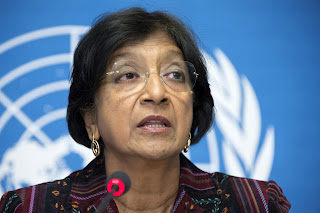 |
| High Commissioner for Human Rights Navi Pillay holds news conference in Geneva. [Photo Credit: UN Photo/Jean- Marc-Ferre |
Washington: The Middle East and North Africa will continue to present
major human rights challenges – and opportunities – for “many years to come,”
the United Nations High Commissioner for Human Rights, Navi Pillay, said today,
stressing in particular the need to do more to end the ongoing conflict in Syria.
“The situation in Syria is quite simply dire,” said Ms.
Pillay. “With no end in sight, and no solutions within easy grasp, we are in
danger of becoming inured to the horrors that Syrian civilians are suffering
day in and day out. But we cannot simply shrug and turn away.”
Speaking at a news
conference in Geneva, Ms. Pillay said that the situation is likely to
descend into an all-out sectarian conflict, as the international community
remains divided on how to end the crisis, which began as an uprising against
the regime of President Bashar al-Assad 20 months ago and has left more than
20,000 people dead and another 2.5 million in need of humanitarian aid.
“The memories of what happened in Bosnia and Herzegovina
should be sufficiently fresh to warn us all of the danger of allowing Syria to
descend into all-out sectarian conflict,” she stated.
“Thousands and thousands of men, women and children have
already been killed, injured, tortured, displaced. It should not take something
as drastic as Srebrenica to shake the world into taking serious action to stop
this type of conflict,” the UN official added. “By remaining divided, the
international community is enabling the continuation of the suffering and
helping create the circumstances for a wider regional conflict.”
She also noted that much work needs to be done in Egypt,
Libya, Tunisia and Yemen – all undergoing their own democratic transitions
after ousting long-standing regimes – to ensure that the human rights and
aspirations of all their people are respected, without discrimination and in
accordance with international standards.
“The situations in each of these four countries are very
different from each other, and solutions will need to be carefully tailored to
the rapidly changing circumstances,” said Ms. Pillay, noting that Libya in
particular is “extremely fragile” after so many years of “disastrous misrule”
by Muammar al-Qadhafi. The North African country has been undergoing a
transition toward a modern democratic State, after decades of autocratic rule
and the toppling of the al-Qadhafi regime.
The human rights situation in Afghanistan will also require
continued monitoring and support as the transfer of security responsibilities
and withdrawal of foreign forces proceeds over the coming years, the High
Commissioner, who began her second term last month, pointed out.
She also highlighted some “neglected” situations that she
intends to shine more of a spotlight on over the next two years, including the
human rights situation in the Democratic People’s Republic of Korea (DPRK).
“The use of political prison camps, frequent public
executions and severe food shortages, coupled with the extreme difficulty of
gaining access, make DPRK singularly problematic,” she stated.
The human rights of people living in areas that are the
subject of unresolved territorial disputes are also often neglected, she noted,
adding that one such example is Jammu and Kashmir in India, where the discovery
of 2,730 bodies in unmarked mass graves was confirmed in a 2011 report by the
Jammu and Kashmir State Human Rights Commission.
“I urge the Indian authorities to fully investigate past
killings and disappearances and bring the perpetrators to justice, as well as
to ensure protection of witnesses and families of the missing and provide them
with redress,” the High Commissioner stated. “These will be critical steps in
the ongoing effort to build confidence with the aim of promoting lasting peace
and stability in the region.”
To deal with these and numerous other issues, she added, it
is critical to increase the resources available to the Office of the UN High
Commissioner for Human Rights (OHCHR), which will
celebrate its 20th anniversary next year.
“As we approach our 20th anniversary, the UN human rights
system is at a pivotal moment in its history. Human rights are so wide-ranging
and all-encompassing, and, sadly, still so commonly abused, that clearly we
need to become bigger, better, faster, and stronger,” Ms. Pillay said.
She added, “There is very little fat to cut, and I fear
unless more donors, both governmental and private, come to the rescue, the
damage to our operations could be considerable, and the much-needed momentum
gained over the past few years risks being halted in its tracks.”


